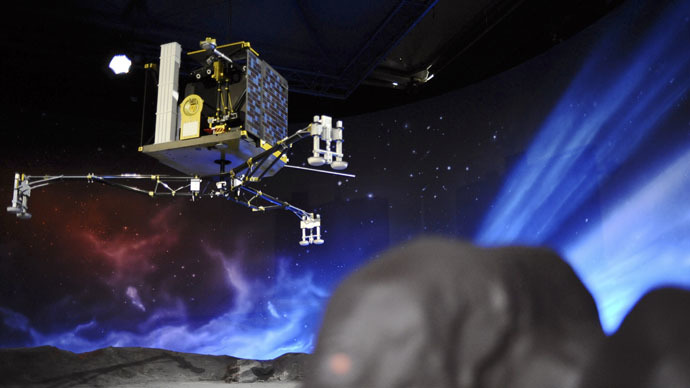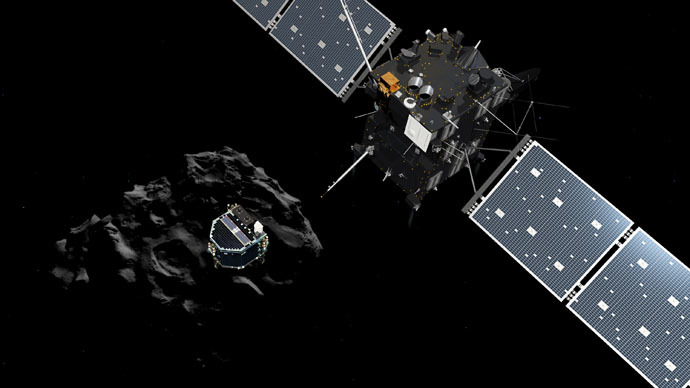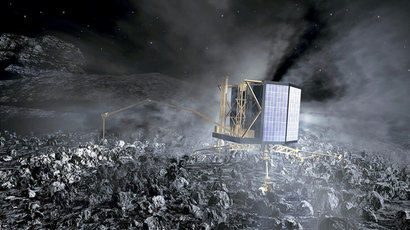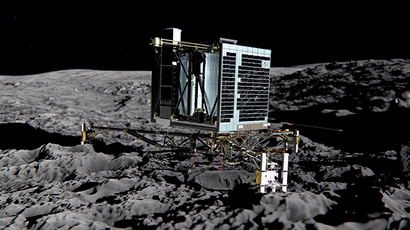Asteroids brought water to Earth - Rosetta space probe finds

Data from the Rosetta spacecraft says asteroids and not comets are likely to have formed the Earth’s oceans. The probe found the water vapor it’s been studying on Comet 67P is significantly different to that found on our planet.
The key part of the discovery is the ‘flavor’ of the water that is found on earth. The vast majority of water molecules on our planet are made up of hydrogen and oxygen atoms. However, very occasionally, they will be replaced by a deuterium atom, which looks like water, but is heavier in mass. Deuterium is a form of hydrogen, but has one more additional neutron.
The researchers found that Comet 67P, which is also known as the Churyumov-Garasimenko comet, after the two Russian scientists who discovered it, had levels of deuterium, which were three times greater than that found on Earth.
My first results of #67P’s water composition find it different to Earth’s oceans. Full report: http://t.co/RCDMZMnTL6pic.twitter.com/8bnb1gDyPr
— ESA Rosetta Mission (@ESA_Rosetta) December 10, 2014
The difference dispels the theory that these sheets of ice could have been responsible for forming the Earth’s oceans. Therefore, this has led scientists to believe that asteroids could have been responsible for water appearing on Earth.
“Today asteroids have very limited water, that’s clear. But that was probably not always the case,” said Rosetta study leader Kathrin Altwegg. “In the earliest period of the solar system, 3.8 billion years ago, asteroids are thought to have crashed into Earth regularly in what is called the late heavy bombardment. At that time, asteroids could well have had much more water than they have today,” Altwegg of the University of Bern in Switzerland added, as reported by the journal Science.
READ MORE: ‘Rosetta mission could unlock key to alien life,’ says lead Philae lander scientist
The solar system was created around 4.6 billion years ago with comets and asteroids slamming into each other for another 800 million years. This was known as the Late Heavy Bombardment. However, when Earth was first formed, it is unlikely that any of the surface water from the comets survived as the intense heat of the planet would have boiled off any remaining liquid, which could have formed any oceans.

The comet theory was developed three years ago, after studying Hartley 2. Like 67P, it was believed to have originated in the Kuiper belt, which is a band of comets that started their orbit around Neptune. The Hartley 2 comet had water properties that were very similar to those found on earth. However, the discovery from the Rosetta probe has begun to dispel this theory, as not all Kuiper belt comets contain heavy water as was previously believed.
READ MORE: 'Rotten eggs & horse pee': Rosetta probe sniffs comet 67P…and it stinks!
“Models of asteroid and comet motion within the solar system suggest asteroids were more likely to cross paths with Earth, but we don't yet know if they had the right mix of water to create the oceans. We need many more measurements of this type to get an understanding of the diversity within the population," said Edwin Bergin of the University of Michigan, as reported by the New Scientist.
Did comets and asteroids bring water to Earth? @ESA_Rosetta reignites debate. Details: http://t.co/jywZ337Y7x#67Ppic.twitter.com/ycLP9lgsRK
— NASA (@NASA) December 10, 2014
Those studying Comet 67P admit that a lot more research needs to be done, but Altwegg admits that “in the end, Earth's oceans are probably a mix of many things."
"It is a very exciting study that raises more questions than it answers," says geophysicist Nicolas Dauphas of the University of Chicago, who was not part of the discovery team. "The mission is a tremendous success for space exploration and for science in Europe," National Geographic reported.
The European Rosetta spacecraft snapped this incredible "selfie" pic.twitter.com/TDaZW3lhGs
— Amazing Pictures (@BeautifuIPicsHQ) December 11, 2014
However, the team has not been helped by a failure of the Philae instrument, which meant that not enough energy was provided to the comet’s solar panels. This stopped researchers comparing data from two different sources, which would have given their results a sounder basis.
"The identification of molecules is certainly more difficult," says Altwegg, who had hoped to compare ROSINA's data from the Rosetta spacecraft with Philae's Ptolemy instrument, which was designed to measure molecules in a different way. "If you have two different instruments you can resolve it, and this we cannot do, so it's all on ROSINA more or less," Altwegg concluded, as reported by the New Scientist.














